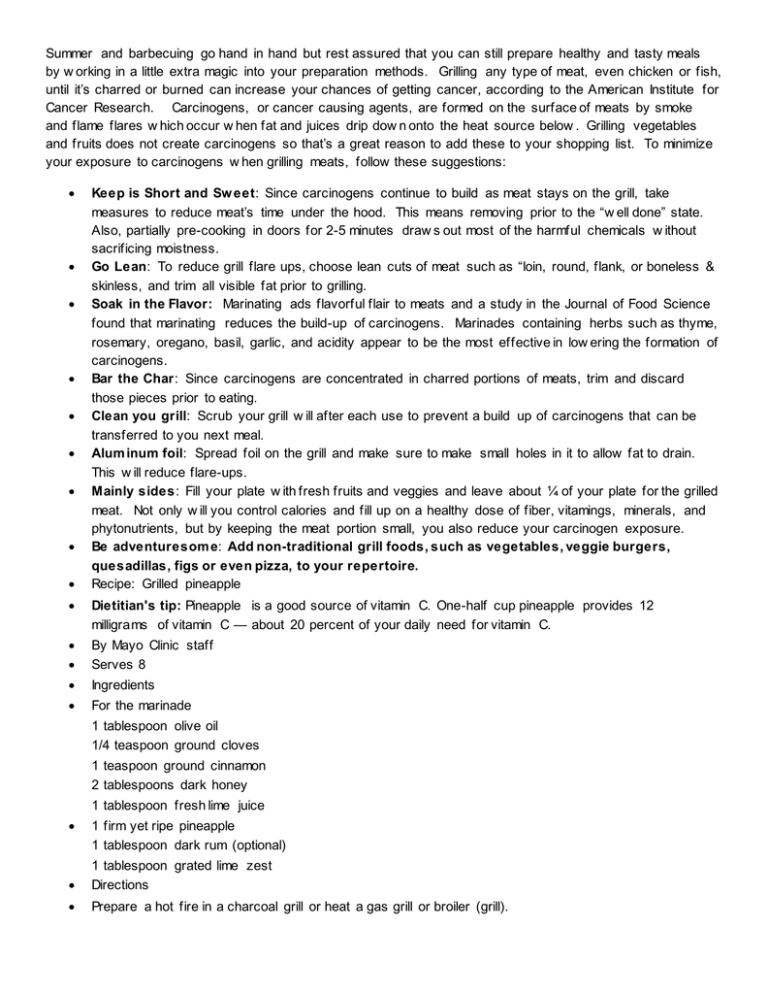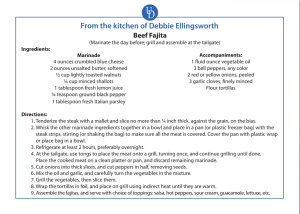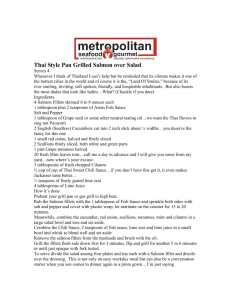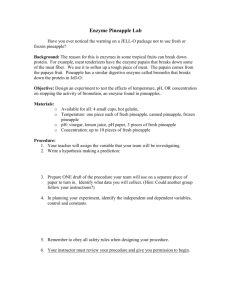Document 10397849
advertisement

Summer and barbecuing go hand in hand but rest assured that you can still prepare healthy and tasty meals by w orking in a little extra magic into your preparation methods. Grilling any type of meat, even chicken or fish, until it’s charred or burned can increase your chances of getting cancer, according to the American Institute for Cancer Research. Carcinogens, or cancer causing agents, are formed on the surface of meats by smoke and flame flares w hich occur w hen fat and juices drip dow n onto the heat source below . Grilling vegetables and fruits does not create carcinogens so that’s a great reason to add these to your shopping list. To minimize your exposure to carcinogens w hen grilling meats, follow these suggestions: Keep is Short and Sw eet: Since carcinogens continue to build as meat stays on the grill, take measures to reduce meat’s time under the hood. This means removing prior to the “w ell done” state. Also, partially pre-cooking in doors for 2-5 minutes draw s out most of the harmful chemicals w ithout sacrificing moistness. Go Lean: To reduce grill flare ups, choose lean cuts of meat such as “loin, round, flank, or boneless & skinless, and trim all visible fat prior to grilling. Soak in the Flavor: Marinating ads flavorful flair to meats and a study in the Journal of Food Science found that marinating reduces the build-up of carcinogens. Marinades containing herbs such as thyme, rosemary, oregano, basil, garlic, and acidity appear to be the most effective in low ering the formation of carcinogens. Bar the Char: Since carcinogens are concentrated in charred portions of meats, trim and discard those pieces prior to eating. Clean you grill: Scrub your grill w ill after each use to prevent a build up of carcinogens that can be transferred to you next meal. Alum inum foil: Spread foil on the grill and make sure to make small holes in it to allow fat to drain. This w ill reduce flare-ups. Mainly sides: Fill your plate w ith fresh fruits and veggies and leave about ¼ of your plate for the grilled meat. Not only w ill you control calories and fill up on a healthy dose of fiber, vitamings, minerals, and phytonutrients, but by keeping the meat portion small, you also reduce your carcinogen exposure. Be adventuresom e: Add non-traditional grill foods, such as vegetables, veggie burgers, quesadillas, figs or even pizza, to your repertoire. Recipe: Grilled pineapple Dietitian's tip: Pineapple is a good source of vitamin C. One-half cup pineapple provides 12 milligrams of vitamin C — about 20 percent of your daily need for vitamin C. By Mayo Clinic staff Serves 8 Ingredients For the marinade 1 tablespoon olive oil 1/4 teaspoon ground cloves 1 teaspoon ground cinnamon 2 tablespoons dark honey 1 tablespoon fresh lime juice 1 firm yet ripe pineapple 1 tablespoon dark rum (optional) 1 tablespoon grated lime zest Directions Prepare a hot fire in a charcoal grill or heat a gas grill or broiler (grill). To make the marinade, in a large bow l, combine the olive oil, cloves, cinnamon, honey and lime juice and w hisk to blend. Set aside. Cut off the crow n of leaves and the base of the pineapple. Stand the pineapple upright and, using a large, sharp knife, pare off the skin, cutting dow nw ard just below the surface in long, vertical strips. Cut off any remaining small brow n "eyes" on the fruit. Stand the peeled pineapple upright and cut it in half lengthw ise. Place each pineapple half cut-side dow n and cut it lengthw ise into four long w edges; slice aw ay the core. Place the pineapple in the bow l w ith the marinade and stir to coat the pineapple. Place on the grill and cook about 3 to 4 minutes, basting once or tw ice w ith the remaining marinade. Turn the fruit and move it to a cooler part of the grill or reduce the heat. Baste again w ith the marinade. Grill until the pineapple is tender and golden, about 3 more minutes. Remove the pineapple from the grill and place on a platter or individual serving plates. Brush w ith the rum, if using, and sprinkle w ith the lime zest. Serve hot or w arm. Nutritional Analysis / per serving (1 Wedge): Calories 79, protein <1g, carbohydrate 15g, total fat 2g, saturated fat <1g, monounsaturated fat 1g, cholesterol 0 mg, sodium 1 mg, fiber 1g.




